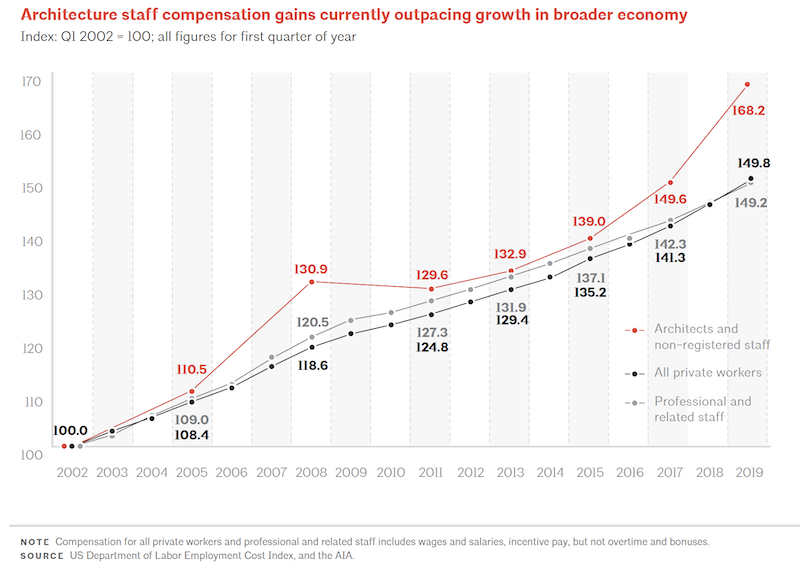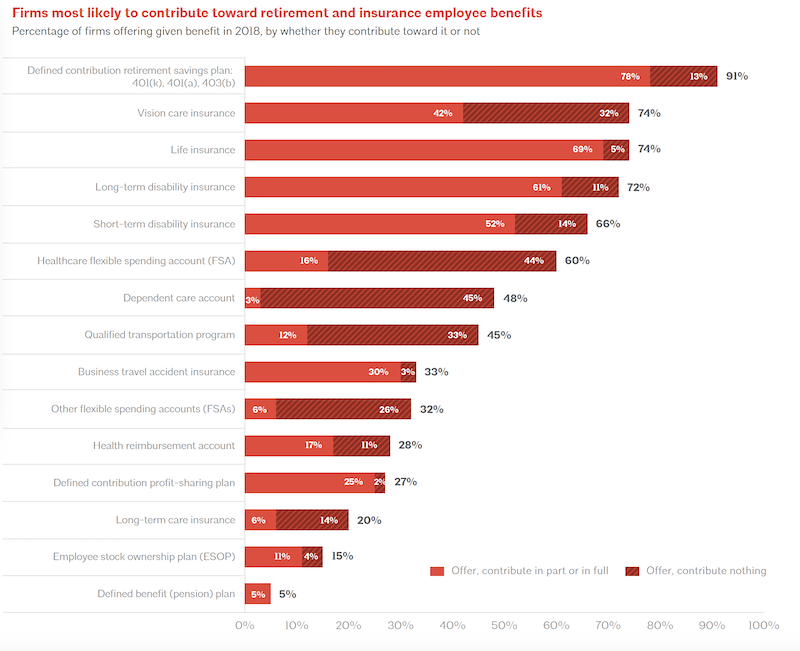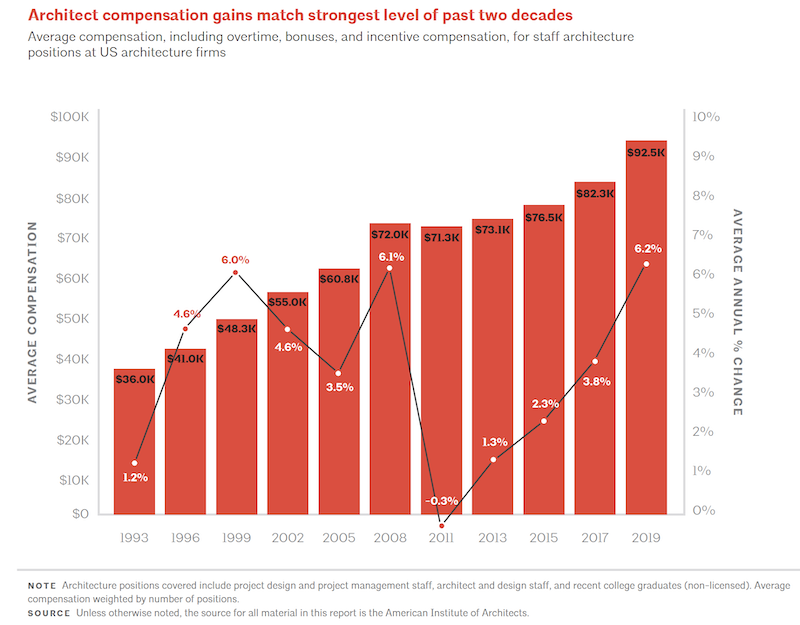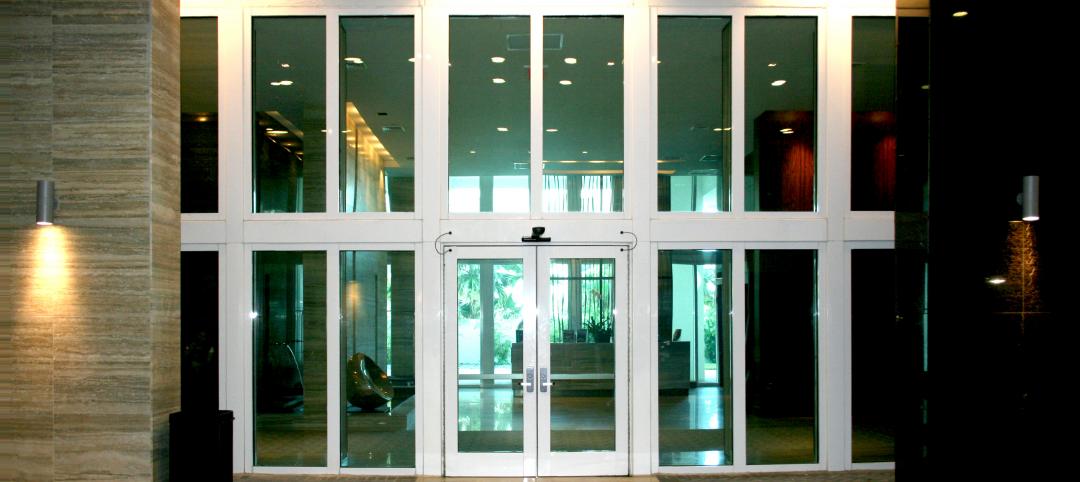The burst in construction spending over the past several years has been a boon to architectural firms, where as an industry payroll employment has grown by an average of 7,500 positions per year over the past six years. About 4,500 of that annual increase in staffing have been for architectural positions.
Demand for architects is reflected in the increased compensation that firms have been bestowing on hires and employees for recruitment and retention. In its latest Compensation Report, the American Institute of Architects (AIA) finds that average compensation across all architectural staff positions averaged in excess of $92,000 at the beginning of 2019, up more than 6% per year from early 2017 levels.
That increase, though, comes with a stinger: the last times architect salaries reached an increase of 6% per year—1999 and 2008—were either just prior to, or as the economy and the construction sector were entering, national economic downturns.
That being said, average architectural compensation has seen substantial growth beyond mere inflation over the past two decades. In 2019 dollars, average architecture compensation in 1990 was just over $70,000. The 12% increase over the past two years was twice the pace of growth in compensation for all workers in the U.S. economy, and 2.5 times the pace of all professional and related state, according to the Department of Labor’s Employment Cost Index.
 Compensation gains for architectural staff have exceeded those for other workers.
Compensation gains for architectural staff have exceeded those for other workers.
The AIA Compensation Report is based on a national survey conducted by AIA and Readex Research earlier this year. Responses from 640 firms with 959 locations are broken down by 28 states, 28 metro areas, and 16 cities. The survey provides in-depth compensation information on 44 positions.
The survey finds wide ranges of compensation by metro and position. For example, the average base pay plus compensation for recent non-licensed graduates was $55,790 nationally. San Jose paid the highest ($65,900) and Pittsburgh the lowest ($45,800). However, the grads hired in San Jose were paying 38.5% of their compensation in rent, whereas in Indianapolis, rent consumed only 16.7% of their paychecks.
Architecture salary trends
Average architect salary increases during the last two years continued to be highest across senior- and executive-level staff. And salaries varied widely by company size. For example, the national average for the CEO/president position was $246,130. For firms with fewer than 10 employees, it was $170,436; for firms with 250 or more employees, $435,930.
The same pattern emerges for the Director of Design position: a $193,460 national average, $132,650 for the smallest firms, $235,200 for the largest. For a senior architectural staffer, the national average was $112,960, for smallest firms $82,170, and for the largest firms $128,660.
 Architectural firms have been improving their employee benefits packages.
Architectural firms have been improving their employee benefits packages.
Many positions, especially more senior architectural staff, continued to see an increase in the share of their salaries that is non-guaranteed (e.g., overtime, commissions, bonuses, incentive pay, profit sharing, retirement benefits paid, and other cash compensation) versus guaranteed (i.e., base pay). Managing principals now have the largest share of their salary as non-guaranteed pay compared with the other architecture/design positions, with the largest percentage point increase from 2017 in the share of non-guaranteed pay from 28% in 2017 to 42% in 2019.
Related content: Top 150 Architecture Firms for 2019
In general, firms are improving their benefits packages. Ninety-five percent of firms offer medical coverage to their employees, and 91% offer defined contribution retirement savings plans. Seventy percent offer paid time off for exams and other professional development. But only 41% offer paid parental leave.
Many firms report that in 2018 they encouraged diversity in hiring and actively engaged in steps to enrich their firms’ culture and retain employees throughout different life stages. For example, 36% conducted a salary equity assessment by gender and/or race, and 80% indicated that they have specifically hired, promoted, and/or mentored employees with diverse backgrounds.
Related Stories
| Sep 23, 2011
Fire and hurricane rated glazed wall assemblies installed at multi-family residence in Florida
Fire and hurricane assemblies meet design and code requirements.
| Sep 23, 2011
ABI turns positive after four monthly declines
On the heels of a period of weakness in design activity, the Architecture Billings Index (ABI) took a sudden upturn in August.
| Sep 23, 2011
Under 40 Leadership Summit
Building Design+Construction’s Under 40 Leadership Summit takes place October 26-28, 2011 Hotel at the Monteleone in New Orleans. Discounted hotel rate deadline: October 2, 2011.
| Sep 20, 2011
Jeanne Gang wins MacArthur Fellowship
Jeanne Gang, a 2011 MacArthur Fellowship winner described by the foundation as "an architect challenging the aesthetic and technical possibilities of the art form in a wide range of structures."
| Sep 20, 2011
Francis Cauffman wins two IDA design awards
The PA/NJ/DE Chapter of the International Interior Design Association (IIDA) has presented the Francis Cauffman architecture firm with two awards: the Best Interior Design of 2011 for the W. L. Gore offices in Elkton, MD, and the President’s Choice Award for St. Joseph’s Regional Medical Center in Paterson, NJ.
| Sep 20, 2011
PPG, Pleotint to co-market environmentally adaptive glazing technology with low-e glass
Laminated between two lites of glass, SRT interlayer may be used monolithically or within an insulating glass unit.
| Sep 19, 2011
Portland team hired as LEED and commissioning consultants for $5.5B downtown sustainable project in Qatar
The $5.5 billion sustainable downtown regeneration project underway by Msheireb Properties will transform a 76 acres site at the centre of Doha, Qatar’s capital city, recreating a way of living that is rooted in Qatari culture, attracting residents back to the city center and reversing the trend for decentralization.
| Sep 16, 2011
Chicago Architecture Foundation partners with seven renowned architects to re-imagine Chicago neighborhoods
Design on the Edge presents plans created by seven teams of nine Chicago-based architects to reimagine seven of the city’s neighborhoods to encourage street life, retail districts and dense housing around the existing “L” transit system.
| Sep 14, 2011
USGBC L.A. Chapter's Green Gala features Jason McLennan as keynote speaker
The Los Angeles Chapter of the nonprofit USGBC will launch its Sustainable Innovation Awards this year during the chapter's 7th Annual Green Gala on Thursday, November 3.
















